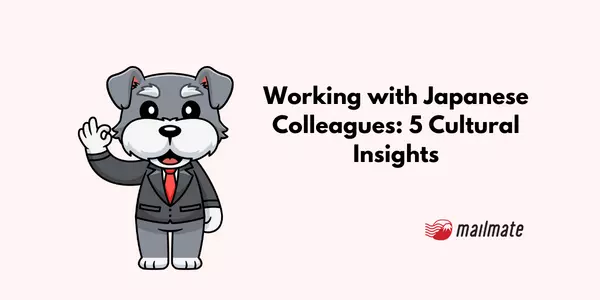Working with Japanese Colleagues: 5 Cultural Insights

Why do Japanese employees or colleagues act that way?
A better question to ask: How do etiquette experts teach Japanese employees to behave?
If you have been wondering how to motivate or manage your Japanese employees, perhaps a different way to understand your Japanese employees' behavior is to understand how Japanese employees are taught to behave when entering the workforce.

Nishide Hiroko, a business management consultant to many Japanese companies, teaches Japanese employees correct etiquette in her book Business Manners and Tips (trans. title).
Understanding the advice dispensed by etiquette experts in Japan, such as in books like this one, can provide insight for anyone directly managing Japanese employees or working with Japanese colleagues.
Here are 5 pointers that will help you further understand Japanese cultural and behavioral patterns, translated and summarized from Ms. Nishide's book.
Point 1. "Do everything with consideration."
In the opening pages of her book on business etiquette, Ms. Hiroko covers 10 essential points, one of which is how to use one's imagination to be considerate of others.
She says, "To be a true business great, you must endeavor to stand in the shoes of your customers and your co-workers. To do this requires great imagination.
Continually think of what the other person might be wanting and how you can help them execute their duties comfortably. Establish the habit of using your imagination to anticipate the needs of others."

Many visitors to Japan, as well as those who find themselves working in Japan, are often impressed by the thoughtfulness and consideration of the Japanese. But these are aspects that Japanese are expressly told to cultivate and taught from an early age to embrace.
An excerpt from the 2019 white paper (Japanese PDF) by Japan's Ministry of Land, Infrastructure, Transport and Tourism (MLIT) revealed that close to 80% of the 1,000 surveyed believed that respecting others and being considerate is vital.
In contrast, only 50% viewed standing up for oneself (sticking to one's intention) and not being swayed by authority as important.
Additionally, the white paper revealed that Japanese people value consideration and harmony more so now than in the past.
The paper speculated that the repeated natural disasters and the economic crash further fostered these characteristics in Japanese citizens.
Point 2. "Work begins the moment you leave your house."
Have you ever wondered why Japanese dress so formally to go to work?
Here's one explanation taken from Nishide's book on business manners: Employees are taught that the moment they leave their house to go to work, they represent the face of their company.
They are explicitly told to behave in a way that won't bring shame to their company, even when not on company premises. (Perhaps one exception to this is after-work drinking parties as the one time they are allowed to let loose.)
The book goes on to say that regardless of your salary, "If you are paid even 1 yen for your effort, you must view yourself as a professional and therefore a representative of the company that has hired you, so act accordingly."
Point 3. "A communicative attitude is vital."
From an early age, Japanese learn to perform greetings with vigor and often greet their teachers and principals with something close to a yell.
Greeting your neighbors is also an essential aspect of being considered well-mannered in Japanese culture.
Those who can't perform basic interactions are referred to as "aisatsu dekinai hito"—basically someone who can't do greetings, which is a mark against you.
Employees in Japanese companies are not required to shout greetings. Still, Japanese business etiquette requires that you greet everyone you come across in your company, from the typical ohayougozaimasu = “good morning” to otsukaresamadesu = “thank you for your hard work” when you pass someone in the hall.
En Japan KK surveyed 4,790 users on workplace communication. Unsurprisingly, 98% declared that "smooth communication has a positive effect on work."
When asked what respondents take special care to do when communicating, "pleasant greetings" was the most selected option at 68%, and "having a bright smile" at 62%, and "the right amount of distance" at 57%.
Within a Japanese company, establishing good working culture begins with becoming familiar with daily set greetings.
Point 4. "Do not be a burden or a bother to others."
「迷惑かけないように。」= maiwaku kakenai youni is the phrase that many mothers use to scold their children. Essentially, it means, "Don't be a bother to the people around you."
The notion of "not being a bother" is everywhere in this Japanese book on business manners.
This is the underlying mindset that governs everything in a Japanese workplace—from how to schedule appointments with colleagues to why you should avoid asking pointed and personal questions (which could cause discomfort or distress).
Somewhat related to this concept of avoiding bothering others: There is one time when Japanese are forgiven for skipping work—and that is if they have caught a cold.
Coughing and sniffling within the office causes a disturbance and an unpleasant atmosphere for those around you. In this one case, to avoid disturbing others—you shouldn't go to work.
The next time you catch a cold accompanied by a bad cough, no one will hold it against you if you stay home—because you will be showing your care for others by staying away.
Point 5. "An apology is a way to move forward."
Do you feel your Japanese employees or colleagues apologize too much?
If you or someone in your company has made a mistake, the first thing this business etiquette book teaches is to apologize before attempting to rectify the situation.
Even when the mistake isn't their own, the employee is taught to apologize to defuse the situation.
In the US and other Western cultures, saying sorry is near to admitting fault. In contrast, in Japan, apologizing is a formality and a stepping-stone for moving on.
The bottom line here, try not to feel peeved if your Japanese colleagues or employees are excessive in their apologies. It is how we are taught to behave when we want to show a willingness to get on with it.
Closing thoughts
Your Japanese colleagues or employees may not behave as outlined above.
Their behavior and work culture will also depend on their individual work experience and whether your company has an international business culture.
Nevertheless, understanding these points about what is considered polite business behavior in Japan can help to demystify why Japanese employees behave the way they do and lessen any cultural communication divide you may be experiencing.
Spending too long figuring out your Japanese mail?
Virtual mail + translation services start at 3800 per month. 30-day money-back guarantee.

